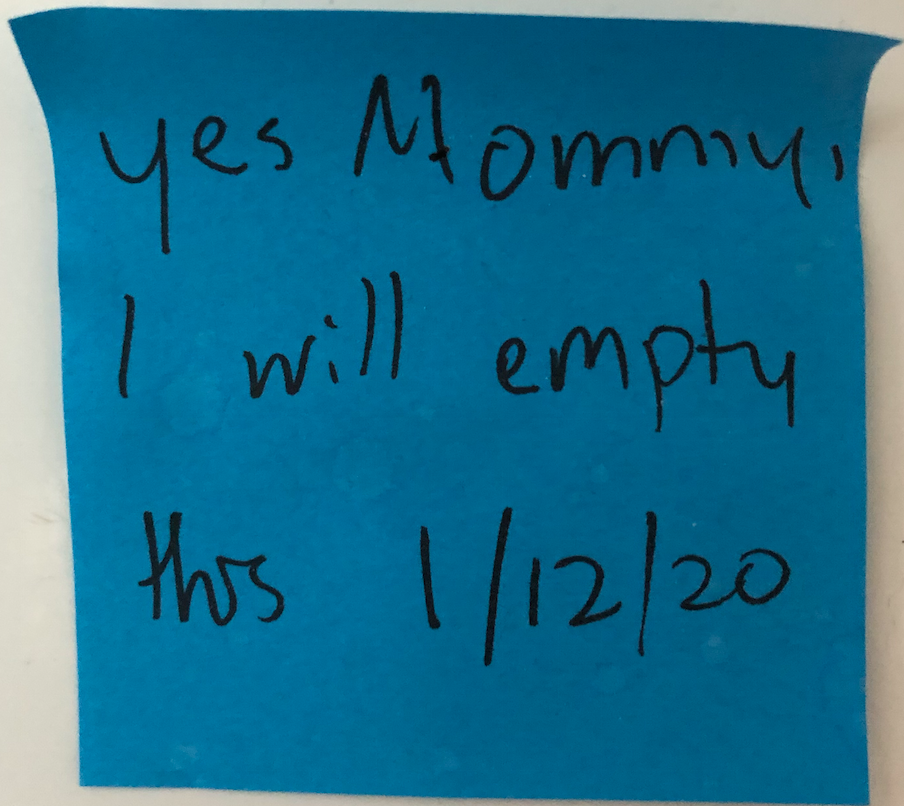Do you nag? More then once? Here’s a clever twist . . .
Thanks so much for the (always helpful) session and the links you sent re: nagging and (dis) empowering communication. I shared both with my family, which led to a VERY interesting discussion. Sophie (age 12) wanted to know what you have the “Nagee” read. In other words, the Nagger apologizes for employing a tool that is unproductive. What do you ask the person who is being (passive) aggressive / uncooperative / unresponsive etc to read so that they understand their contribution in a productive way that fosters a constructive dialogue?
email from Organizing Client with 12 year old twins.
WOW! What a genius question Sophie!!
Communicate with the nagger in a mutually respectful way. The note above is what one 14 year old left on a bathroom trash can she shares with her mom. Our kids often don’t want us to be angry with them, but they really do NOT understand why we get soooooo worked up over things like full trash cans.
Be honest about what you are actually going to do. Don’t say “Yeah, sure.” when you have no intention of doing it. It gets you off their back for the moment, and is colossally disrespectful. You know how ANNOYED you are when they nag? You are creating the same thing when your mouth says “Yes”, but your feet really mean, “No WAY, you are NOT the boss of me.”
Give the nagger a job - “Mom, I get that you want me to study, and instead of reminders I would really appreciate if my little brother could be out of the house on Thursday afternoons so I can get ready for my Friday quizzes.” “Dad, I understand you want the basement cleaned up after sleepovers on the weekend. Could we could do our weekly Chipotle run on Sunday at 2pm so I have something to look forward to after the excruciating cleaning up?”
Interpret what you are hearing when they nag. Often times naggers think they are being helpful, if they are not then help them understand — “When you nag me, what I think you mean is . . I can’t trust you, you aren’t going to make it without me, your judgement is very poor, or you are lazy.” Then ask them, “Mom-do you think I’m lazy or do you think I don’t understand the homework?”
Volunteer to do some chores that are LESS excruciating for you . . . and then do them.
EXAMPLE: Our 22 year old came home for winter break and we all fell into our familiar old roles. I issued chore commands to him, he told his little brother to do the chore, I yelled at him to stop issuing commands to his younger brother. I went up to him and said, “This doesn’t work, I don’t want to feel like I’m doing all the work.” The next day he came to me and said. “Mom, I do stuff all the time around the apartment back at school. I really don’t mind doing chores, but I HATE when you tell me to do stuff. I will volunteer to clear the dishwasher and prep a couple dinners while I’m home and then you won’t have to come up with things for me to do.” GASP! How respectful - now I had to do my part and zip the old lip even when I really, really wanted to issue an ADDITIONAL command, demand, request. With this new respectful communication, I have to say we had the most lovely break I can remember.
Problem solve. Sometimes naggers are focused on getting it done their way. However, that’s not the only way. Naggee - think about a win/win solution. How about getting a bigger trash can for that shared bathroom and it only has to go out twice a month.
Just FREAKING DO IT. Sometimes just do the chore or task after one request. Save all that energy and good will for something you’d love to do with the your parent.

